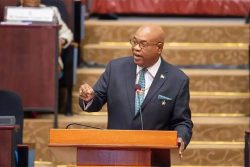Last week’s column, the first in 2023, was also the last in an extended 14-part series that focused on my re-visiting Guyana Government Take and its officially pronounced hydrocarbon resources. Mainly due to requests from readers, during last year, several similar series were presented as responses to similar requests. These included the series on the Buxton Proposal; Local Content Requirements; Natural Resource Fund /Sovereign Wealth Fund; the ExxonMobil oil super-major; General Theorizing on Guyana’s Oil Opportunity.
Following intermittent local social media and press reports to the effect that, the Authorities are considering building modular oil refineries, I have been persuaded to 1] re-visit my standing recommendation to establish a National Oil Company as a top priority and 2] evaluate whether the construction of state-owned refinery capacity makes economic sense as essential to Guyana’s growth and development at this juncture.
Starting today, and over the next few columns, I shall briefly indicate my present position on these two considerations. But before doing so, I take advantage of the conclusion of COP27 held last November [2022] to offer a few remarks on global efforts towards a sustainable global energy mix transition, and by extension any narrowing of Guyana’s oil and gas opportunity.
COP 27 and Guyana’s Oil Window
My conclusion last week was brief and to the point. To quote:
“Conclusion; Sadly ,last year’s COP27 outcomes confirm, and do not restrict, the relentless march of carbon emitting fuels.”
Starting with its controversial venue [Egypt], COP27 was mired in interminable human rights controversies; raging disputes over common and differential burden-sharing of environmental obligations and responsibilities of states, contention and disagreements as regards to the equitable distribution of developmental and associated equity obligations. All this at a conjuncture of a crisis-ridden global system, locked in the final phase of a post-Covid 19 pandemic that has raged worldwide; along with stubborn inflation, war and seeming retreat from multilateralism and globalization; in a time when national security considerations have grown apace.
The above dynamics are reinforced by notable outcomes such as 1] a widening divide in the stances of rich and poor countries in regard to defining, diagnosing, and treatment of the global climate transition; and burden sharing of the original lead polluters versus today’s 2] growing gap between state environmental pledges and their performances and 3] a global environmental lobby long on self-affirmation and short on science-based information and theoretical insight and finally 4] an open reversal of promises to reduce petroleum consumption as geo-political and national security concerns trump all others.
National Oil Company (NOC)
In this context what is the sort of NOC to which I am referring? Here I can only repeat my original contention, which I stand by firmly. It is for a Company that is conceived as a national strategic policy choice, for which the Authorities should embrace by circa 2025. That choice requires the State as resource owner to leverage that resource value to acquire a carefully arrived at “working interest’ in ExxonMobil and its co-ventures COVs operations.
The original call had evoked considerable controversy. At its heart, this controversy reflected on very different development paradigms and praxes, which is indeed typical of national strategic policy choices. Thus, my perspective prioritizes the need to 1] constrain foreign dependence and control over natural resource exploitation as a strategic option and 2] correspondingly expand the nation’s influence over the use of its natural resources. While, its polar opposite prioritizes 3] expanding the opportunities for markets to guide efficient natural resource exploitation and 4] confining the roles of government in natural resource exploitation to regulation, monitoring and oversight.
NRGI (NOC)
In truth, a NOC which is founded on the Natural Resource Governance Institute, NRGI’s precepts best portrays the pivotal features of my proposal. These precepts seek to harness a country’s development potential arising from hydrocarbons discovery. As such, the design yields multiple benefits; including, 1] the capture, in an economically efficient manner of the economic rent yielded by relative inelastic petroleum potential. 2] balancing trade-offs between state revenue capture and national losses incurred in dis-incentivizing private investment flows 3] recognizing that taxes can never capture all available economic rent.4] offering a means whereby technology can be incentivized to be transferred from operating in the offshore sector to locally; especially in regard to “efficient business practices”.
The existence of a NOC along the lines indicated here, also reduces the information asymmetry, which bedevils operations of IOCs in poor countries. It has been long recognized universally that, when information is widely lacking, then the best use of resources is most unlikely. Information is therefore crucial to the efficient commercial and economic use of Guyana’s oil and gas resources. A NOC always facilitates the flow of requisite information to the Authorities and the general public.
Taken together, the above considerations serve to generate other economic externalities and benefits. Using an earlier metaphor, I repeat a NOC gives Guyana a proverbial “seat-at-the-table” of decision-making in regard to both the pace and disposition of its hydrocarbons resources.
Conclusion
A NOC based on NRGI precepts, participating in operational decision making within the petroleum sector gives Guyana a seat at the proverbial Table, and thus influence over upstream outcomes. This yields benefits from 1] local content requirements 2] linkages within the oil and gas sector; and, 3] linkages between the petroleum and non-petroleum sectors.









